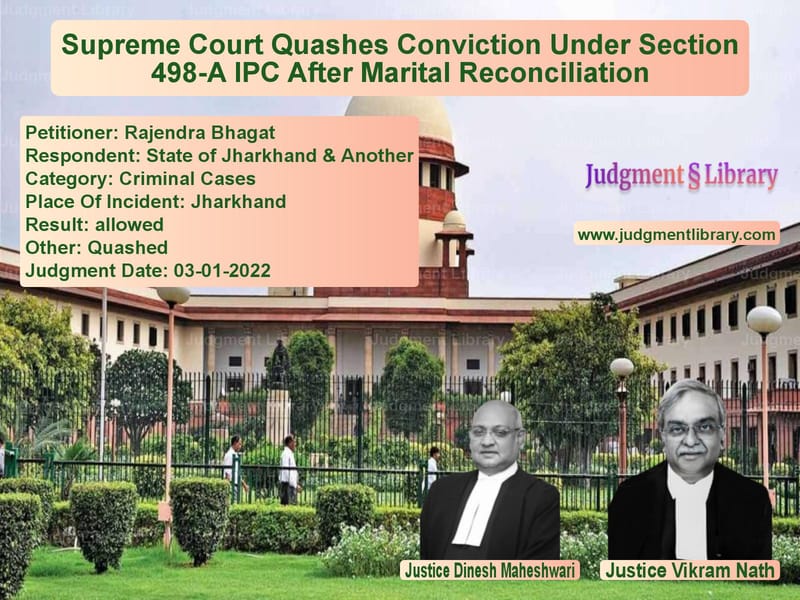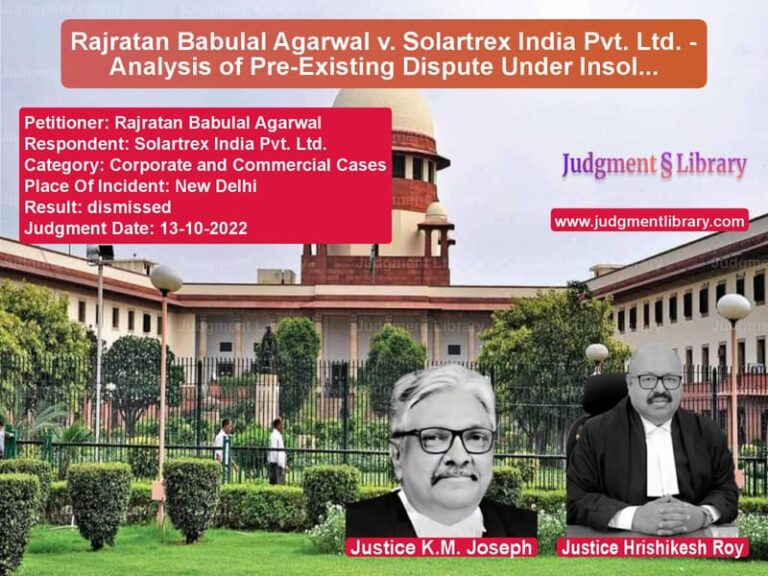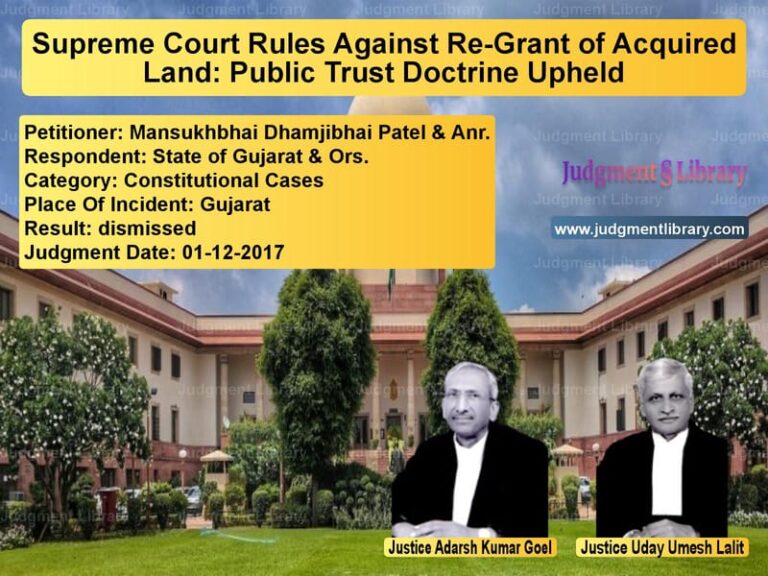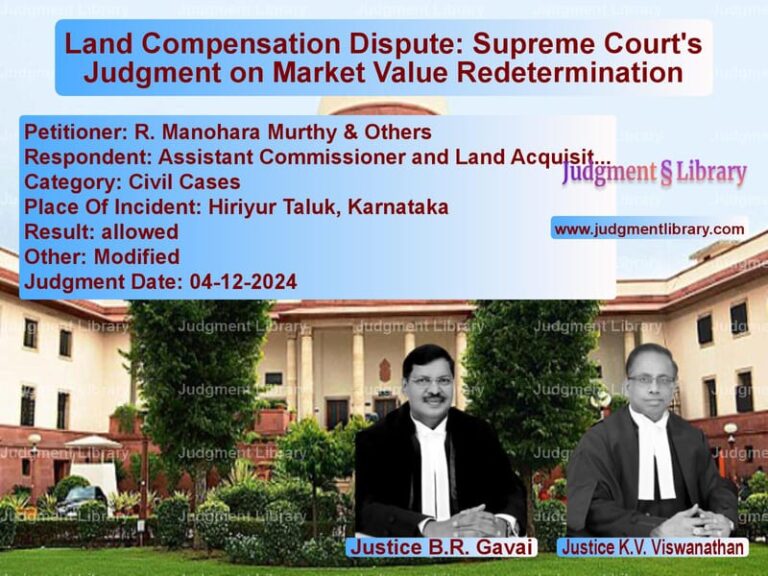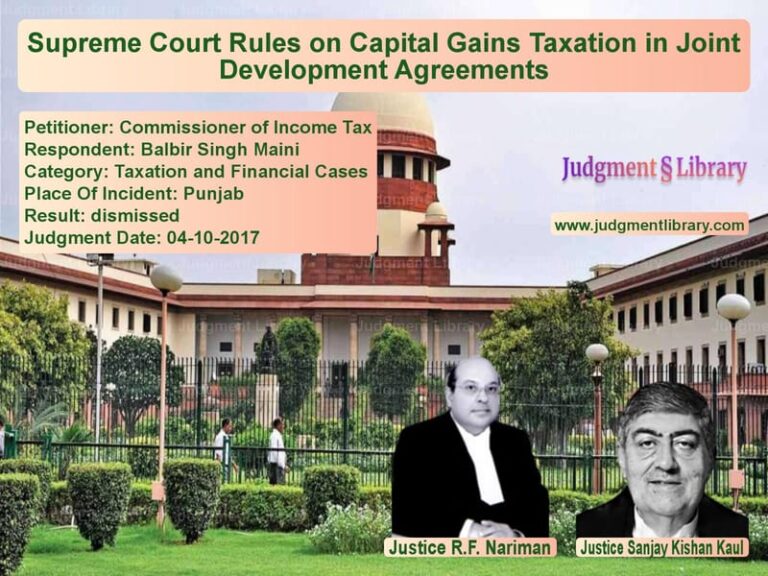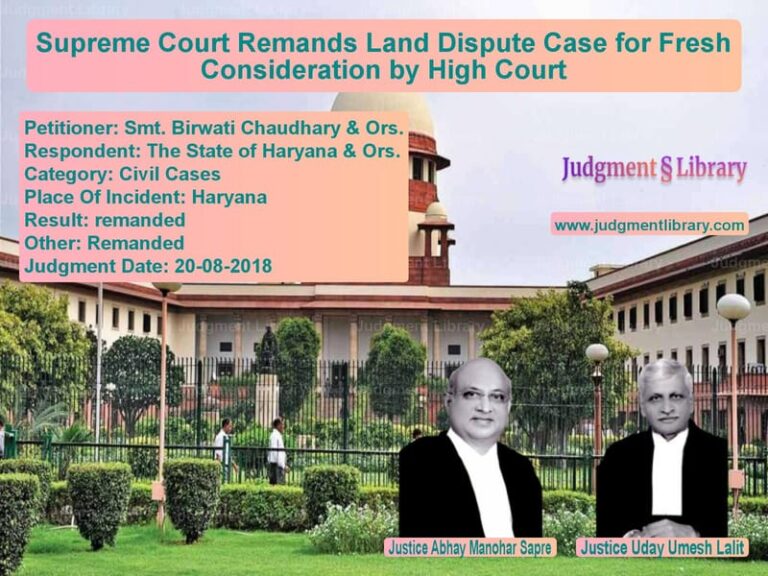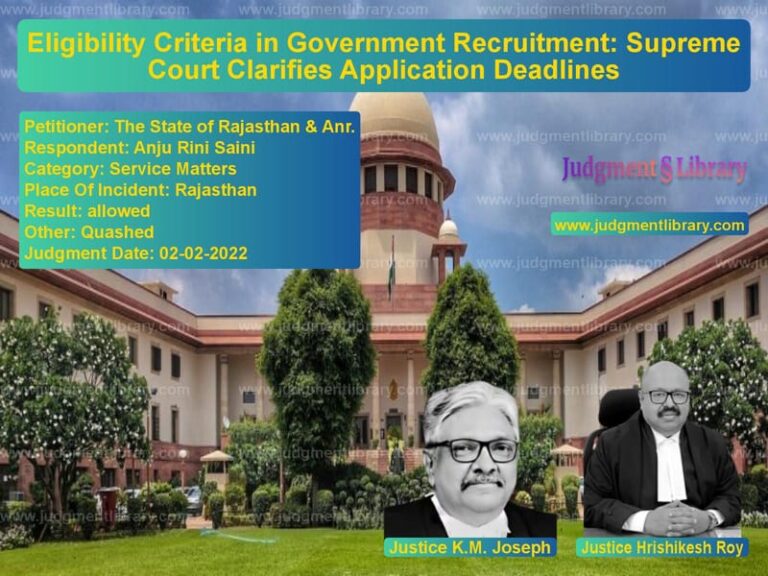Supreme Court Quashes Conviction Under Section 498-A IPC After Marital Reconciliation
The case of Rajendra Bhagat vs. State of Jharkhand & Another is a significant ruling by the Supreme Court concerning the conviction under Section 498-A of the Indian Penal Code (IPC). The Court quashed the conviction after acknowledging the marital reconciliation between the appellant and his wife, ensuring that their renewed relationship was not jeopardized by legal consequences.
Background of the Case
The appellant, Rajendra Bhagat, was a serving Naik in the Indian Army. He married the second respondent on May 25, 2013. Following allegations of dowry harassment and cruelty, the wife lodged an FIR (No. 204 of 2014) at Sisai Police Station, Jharkhand. The appellant and his family members were charged under Sections 498-A, 323, 417, and 34 IPC.
Upon trial in GR Case No. 904 of 2014, the Judicial Magistrate, First Class, convicted the appellant under Section 498-A IPC and sentenced him to three years of simple imprisonment. Other accused family members were convicted under Section 323 IPC but were given the benefit of the Probation of Offenders Act, 1958.
The appellant’s conviction was upheld by the Sessions Judge in Criminal Appeal No. 10 of 2019 and later affirmed by the Jharkhand High Court in Criminal Revision No. 910 of 2019, though the sentence was reduced to the period already undergone. However, while the revision petition was pending, the appellant and his wife reconciled and filed a joint application before the High Court, stating that they had resolved their marital discord.
Legal Issues Raised
- Whether the appellant’s conviction under Section 498-A IPC should be quashed in light of the marital settlement.
- Whether courts should encourage genuine settlements in matrimonial disputes to promote family harmony.
- Whether maintaining the conviction despite the reconciliation would adversely affect the couple’s marital life.
Arguments of the Petitioner
The appellant, through his legal counsel, submitted the following arguments:
- Marital Reconciliation: The appellant and his wife had amicably resolved their differences and were living together happily.
- Impact of Conviction: The conviction led to his dismissal from military service, which could financially destabilize the family.
- Judicial Precedents Supporting Quashing: The petitioner relied on B.S. Joshi vs. State of Haryana and Bitan Sengupta vs. State of West Bengal, which upheld the power of courts to quash criminal proceedings in the interest of family harmony.
- Rehabilitation and Stability: The appellant’s wife had given an undertaking that she was willing to continue the marriage, and maintaining the conviction could disrupt their peaceful reconciliation.
Arguments of the Respondents
The State of Jharkhand and the second respondent (wife) made the following submissions:
- Reconciliation Is a Valid Consideration: The wife confirmed in her submissions that she had voluntarily settled the dispute and had resumed conjugal life.
- No Objection to Quashing: The prosecution did not strongly oppose the appellant’s request, given that the couple was now living peacefully.
- Preventing Future Disharmony: Allowing the conviction to stand could lead to financial hardship for the couple, potentially reigniting marital discord.
Supreme Court’s Observations
The Supreme Court, comprising Justices Dinesh Maheshwari and Vikram Nath, made the following key observations:
- Quashing Conviction in Genuine Settlements: Citing B.S. Joshi vs. State of Haryana, the Court emphasized that in genuine cases of settlement, quashing the conviction serves the interests of justice.
- Promoting Marital Harmony: The Court noted that maintaining the conviction could lead to financial distress and undermine the couple’s reconciliation.
- Impact of Conviction on Employment: The dismissal from military service due to the conviction was an unjust consequence when the couple had settled their differences.
- Scope of Judicial Discretion: The Court reiterated that criminal proceedings in matrimonial disputes should not be pursued mechanically when the primary dispute has been resolved.
Final Judgment
The Supreme Court set aside the appellant’s conviction and quashed all proceedings related to FIR No. 204 of 2014. The judgment stated:
“The appeal is allowed, and while allowing I.A. No. 6052 of 2020 moved before the High Court in Criminal Revision No. 910 of 2019, all the proceedings arising out of the said FIR No. 204 of 2014 are quashed qua the appellant. Obviously, the order of conviction of the appellant is set aside.”
Implications of the Judgment
This ruling has several important implications:
- Encouragement of Reconciliation: Courts should encourage marital settlements to prevent the breakdown of relationships due to prolonged litigation.
- Balancing Punishment with Justice: The judgment reinforces that in cases where reconciliation is genuine, continuing with the conviction is counterproductive.
- Judicial Recognition of Private Settlements: The ruling strengthens the precedent that criminal proceedings in matrimonial disputes can be quashed when couples amicably resolve their issues.
- Employment and Rehabilitation: The decision acknowledges that convictions in such cases can unjustly affect employment and family stability.
Conclusion
The Supreme Court’s decision in Rajendra Bhagat vs. State of Jharkhand & Another is a landmark ruling that underscores the judiciary’s role in promoting marital harmony while ensuring justice. By quashing the conviction under Section 498-A IPC, the Court prevented an unnecessary legal consequence from disrupting a settled marriage. This ruling sets a crucial precedent for handling similar cases where genuine reconciliation has taken place.
Petitioner Name: Rajendra Bhagat.Respondent Name: State of Jharkhand & Another.Judgment By: Justice Dinesh Maheshwari, Justice Vikram Nath.Place Of Incident: Jharkhand.Judgment Date: 03-01-2022.
Don’t miss out on the full details! Download the complete judgment in PDF format below and gain valuable insights instantly!
Download Judgment: rajendra-bhagat-vs-state-of-jharkhand-&-supreme-court-of-india-judgment-dated-03-01-2022.pdf
Directly Download Judgment: Directly download this Judgment
See all petitions in Bail and Anticipatory Bail
See all petitions in Domestic Violence
See all petitions in SC/ST Act Case
See all petitions in Judgment by Dinesh Maheshwari
See all petitions in Judgment by Vikram Nath
See all petitions in allowed
See all petitions in Quashed
See all petitions in supreme court of India judgments January 2022
See all petitions in 2022 judgments
See all posts in Criminal Cases Category
See all allowed petitions in Criminal Cases Category
See all Dismissed petitions in Criminal Cases Category
See all partially allowed petitions in Criminal Cases Category

